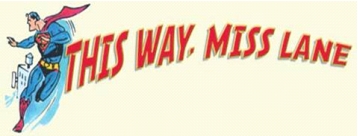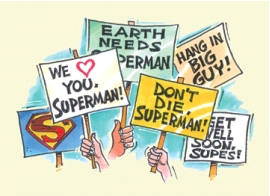

How a mild-mannered executive search consultant found himself guarding Lois Lane on a film set in Australia
 by
Duff Watkins - illustrations by Phil Cornell
by
Duff Watkins - illustrations by Phil Cornell
Act I
Escorting Lois Lane is dangerous work. That’s why I carry a gun.
She’s just visited Superman in the infirmary and now there’s a jumpy crowd of 1,400 people outside waiting for her to exit the Metropolis Hospital.
Placard-waving well-wishers don’t worry me. Dodging signs with “We love you Superman,” “Don’t die Superman!” and “Earth needs Superman!” is easy. It’s the pack of reporters that concerns me. They’re muscling through the police cordon, ready to accost Miss Lane when she appears. I’ll have to fight through the surging crowd if we’re to make it to the other side. But when you’re a sergeant in the Metropolis Police Force, crowd control is part of the job.

How I became a “featured extra” in a $200-million movie is a greater mystery than why the Man of Steel is hospitalized. (Bullets bounce off him, so what’s he got—Kryptonite flu?)
Acting isn’t in my blood so much as in my lymphatic system. I worked at the Norton Center when it was the Regional Arts Center and studied acting under Centre legends West T. Hill and Jim Thorp. Evidently I paid attention, for I’m about to be linked to Superman in cinema history.
Best of all, I have a line. Four words to be exact: “This way, Miss Lane.” You don’t have to be Bogart, Burton, or Brando to speak four words. As Stanislavski said, “There are no small parts, only small actors.” So I figure those four short words are my ticket to Hollywood.
Technically speaking, my movie debut is due less to me possessing talent than to me possessing an American accent. Plus they needed 1,400 extras, fast, to film a crowd scene. But it would be churlish of me to argue with destiny.
Fate called, I answered.
Fame beckoned, I responded.
Surely Fortune will follow?
If acting is a voyage of self-discovery, I’m running aground. Simply donning a policeman’s uniform and carrying a gun puts me in touch with my inner despot. Fortunately for society, the gun is disabled and locked into my holster so I can’t slap leather, draw my weapon, aim at the crowd, and shout “freeze, you *%!#X&!!,” all of which I long to do. There are 25 other cops in the scene but I’m the only officer. Immediately I start barking orders; immediately 25 patrolmen ignore me.
I snap back to reality when told to select a name tag for my character. Thus I become Police Sergeant Robey, a name chosen in honor of the University of Kentucky’s 1978 championship basketball team captained by Rick Robey.
An American child actor is on the set so they’ve flown in a child welfare specialist from the U.S. to ensure that the kid is treated well. Because I sound so authentically American, I’m asked a zillion times by the other actors if I was flown in especially for this role.
“No,” I say, but they do think enough of my talent to pay my train fare into the city.

Act II
Screenwriter William Goldman once said that the most exciting day of your life is your first day on a movie set; the most boring day of your life is every day thereafter on a movie set.
From 6 a.m. to 6 p.m., for two days, we are required on site. Once dressed, costume attendants photograph me front and back and refer repeatedly to the photos to ensure that tie pins are level, shoulder microphones are placed correctly, and that the gun, belt, and ammo clips are positioned exactly the same way for each take. Everything is real and accurate from the badge to the baton. Hollywood knows that an audience must believe what they are seeing. So it spends lots of time and energy to ensure that you do.
We’re on set, inside the hospital lobby, peering outside and waiting for our cue. Lois Lane (played by 22-year-old Kate Bosworth) is flanked by me on one side and another cop on the other side. Through the glass doors I see a Medusa’s head of reporter’s arms waving and swaying. Their hands clutch microphones, cassette recorders, and camcorders.
It may be hot and sunny in Sydney, Australia, but it’s cold and wet in Metropolis. The crowd wears raincoats and jackets. The street is dotted with New York-style yellow cabs, American police cars, and Daily Planet delivery trucks. Even the sewers exude an authentic touch, with steam rising dramatically from the drains. The set, incidentally, is called Shuster Station, named after Superman co-creator Joe Shuster.
“Wow,” I say to myself, “this is just like a movie!”
“Actually,” replies my self, “it is a movie.”
Wherever Metropolis is located, it’s a cosmopolitan place. The crowd outside is motley. Every color, race, and culture has been recruited for this scene. The crowd is the world writ small. That figures. Superman is a world hero. He transcends geography. Hence the signs teetering above the heads of the crowd bear intergalactic pleas: “Earth needs Superman!” “Superman save our world!”
After we do several rehearsal takes, my blossoming film career withers rapidly. The Director confers. Adjustments are made. The Assistant Director informs me that my line has been given to the other cop. Moreover, he’d now like me to stop at the curb and drop out of shot while the other cop escorts Miss Lane through the crowd.
Oh, and another thing, he adds, your chin is blocking everything in the picture so could you keep your face turned away from the camera, please?
Stardom eludes me yet again.
In between takes I banter with the reporters and discover that my prop can of mace is actually vanilla-scented body spray. Instead of asking rowdy crowds to settle down, Metropolis’ Police Department helps them freshen up.
Movie making is a lot like the military. There’s lots of standing around and it’s always “hurry up and wait!” Through it all Kate Bosworth concentrates and stays in character. Indeed she must; she has to cry on cue every take.
After more rehearsals, it’s finally show time. “Camera rolling,” says the Assistant Director, then “action!” Again we exit briskly through the heavy glass doors of the hospital and meet the crowd. Reporters lunge forward. Cameras flash, recorders tape, steadicams whir.

The crowd pushes against us and I push back, allowing my scene-stealing, line-thieving, cop colleague to escort Miss Lane to safety and usher his sorry self into cinema immortality. Maybe Steve McQueen was right when he said, “I’m not sure that acting is something for a grown man to be doing.”
We return to our marks and do another take. Then another. Then several thousand more (or so it seemed). Each time Kate Bosworth retraces her steps and returns to her mark. Each time I hold the door open for her and mutter to myself, “This way, Miss Lane.”
We do more takes until the Director is satisfied, and it’s in the can.
Act III
Now it’s late, and we’re losing our light. My dogs are barking; no, baying. After two days of standing for 12 hours, my feet feel like they’ve marched in Napoleon’s infantry. And I mean the march back from Russia.
Making movies is tiring, tedious, and a tease. They promise you a line and then snatch it away. Yet there is solace, if not stardom, in film work.
Movie making is a collaborative endeavour. Writers say that in Hollywood, nothing is written, everything is rewritten. Nothing is created, everything is co-created. Innumerable hours of human energy, skill, and creativity went into filming our simple, short scene. Incalculable hours went into the making of the movie. It’s serious work. One of the tech crew wears a black T-shirt bearing the words “creativity or death.” That’s the spirit, pal.
An army of crew works behind the scenes to make a movie. Without the crew, no story gets told. But why tell re-tell Superman’s story? What’s new about an alien from another planet that comes to stay? Sounds like ET in reverse.
The answer, of course, lies in philosophy.
Epilogue

Nietzsche, who knew a thing or two about Ubermensch, defined a Superman as one who is willing to risk all for the sake of enhancing humanity.
Now that’s a story worth telling—and filming. So we do. Like creative Crusaders armed only with skill and imagination, our cast and crew form an artistic army that sweeps across reality’s terrain in search of truth, justice, and a nobler way.
The real buzz to being in a movie is marching in that army.
When not appearing in major motion pictures, Duff Watkins is Director, ExecSearch International - Australia, consultants to boards and management. Reach him at dw@execsearch.com.au.
